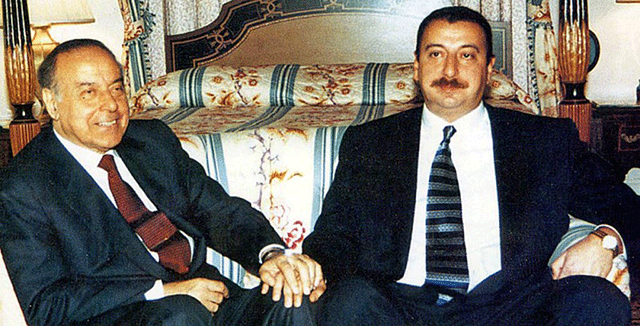By Harut Sassounian
Publisher, The California Courier
Journalist Fin Depencier wrote a lengthy exposé in the San Francisco-based Palladium Magazine, titled: “Ilham Aliyev and the Making of Azerbaijan.”
Read also
The article starts with Ilham Aliyev’s early years in Moscow when his father, Heydar Aliyev, was a member of the ruling Politburo of the Soviet Union.
At the young age of 16, Ilham Aliyev “was admitted into Russia’s most prestigious university, the Moscow Institute of International Relations,” through his father’s KGB connections. He graduated with a PhD in history and taught at the university from 1985 to 1990. He learned fluent English and specialized in British history.
In 1987, Soviet leader Mikhail Gorbachev dismissed Heydar Aliyev from the Politburo. His son, Ilham, was fired from the University after “Heydar criticized Gorbachev’s government for the killing of Azerbaijani civilians in Baku.” Ilham was blacklisted and could not get a job. “He ended up in the clothing business, purchasing a factory on the outskirts of Moscow…. He then briefly relocated to Istanbul.”
In 1993, after Heydar became the president of the Republic of Azerbaijan, he recalled his son to Baku and appointed him vice president of SOCAR, Azerbaijan’s state oil company. When Heydar was involved in a dispute with Western oil companies over Caspian oil rights, he spoke with the newly-inaugurated Pres. Bill Clinton who pressured the companies to accept Aliyev’s conditions. Ilham flew to Houston and signed the agreement which gave SOCAR 20% share in the new oil consortium. The remainder was divided among British Petroleum, Aramco, Russia’s Lukoil, Pennzoil, and others.
After his father’s death, Ilham became President of Azerbaijan in a controversial election in 2003. He purged the old guard of oligarchs and officials and jailed “hundreds of functionaries belonging to the main opposition party, the Popular Front of Azerbaijan.” Among those jailed were “hundreds of journalists, activists, and other opponents of the government from the last two decades. As of 2015, Azerbaijan had more than twice the number of political prisoners as Belarus and Russia combined.” Nevertheless, “Aliyev expected most corruption to flow through him and his family.”
In 1983, “Ilham married Mehriban Pashayeva, whose grandfather was a famous Azerbaijani writer that already had amassed enormous wealth. He expanded the already-large Pashayev fortune by giving family members positions in government, which they have exploited for personal gain.” Here are several examples: “Nargiz Pashayeva, Aliyev’s sister-in-law, is the rector of Moscow State University’s Baku branch. His father-in-law, Arif Pashayev, runs the national aviation academy. Arif’s brother, Hafiz Pashayev, is a deputy minister of foreign affairs and served as U.S. ambassador for over 13 years. And so on it goes — the Pashayevs are now Azerbaijan’s most wealthy family by far. Their conglomerate, PASHA Holdings, owns seven of the ten largest banks in Azerbaijan, along with interests in tourism and insurance.” In 2017, Pres. Aliyev appointed his wife as vice president of Azerbaijan to be his successor.
Aliyev has successfully silenced his foreign detractors “through intimidation and bribery. Azerbaijan manages a network of institutions whose purpose is to distribute funds throughout the West and ensure positive coverage in the media, allies in the business world, and defenders in politics. The network has been most active in Europe: in 2012, the European Sustainability Initiative used the term “caviar diplomacy” to describe Azerbaijan’s practice of bribing EU politicians.
Doing state business in Azerbaijan is comfortable. The regime spends lavishly on hotel suites and dinners for its guests. Friendly journalists are offered access to Nagorno-Karabakh and other select locations. In 2017, Aliyev decided to give 255 loyal Azerbaijani journalists free apartments for their service to the regime.”
In 2017, the Global Anti-Corruption Consortium “revealed a scheme in which the Azerbaijani government laundered $2.9 billion through four shell companies in the UK…. According to the Organized Crime and Corruption Reporting Project, other recipients included “at least three European politicians, a journalist who wrote stories friendly to the regime, and businessmen who praised the government….
In some cases, these prominent individuals were able to mobilize important international organizations, such as UNESCO and the Parliamentary Assembly of the Council of Europe, to score [public relations] victories for the regime.” The European Sustainability Initiative described the scheme as the ‘biggest corruption scandal in the history of the Council of Europe.’”
Journalist Depencier reported that British Petroleum “won the contract to operate the Baku-Tbilisi-Ceyhan pipeline. British mining giant Anglo American PLC has large investments in Azerbaijan and has benefited enormously from Azerbaijan’s victory in Nagorno-Karabakh, as mining sites were seized from the Armenians…. In 2021, it was revealed that Aliyev and his family had a secret real estate portfolio in London worth an astounding $694 million.” British politicians were also coopted. “British Member of Parliament Bob Blackman has taken seven free trips to Azerbaijan since 2011 worth tens of thousands of pounds.”
Azerbaijan has also cultivated a close relationship with Israel. “A 2012 Wikileaks report showed that Israel has secret bases in southern Azerbaijan near the Iranian border. The strengthening of ties between Israel and Azerbaijan was encouraged by the United States.” U.S. officials theorized that “the Israel-Turkey-Georgia-Azerbaijan axis, supported by the U.S., would be a counterweight to the Syria-Iran-Armenia-Russia axis. Israel supplies Azerbaijan with 69% of its imported weaponry, and Azerbaijan supplies Israel with 40% of its energy needs in return.”
Depencier concluded: “Aliyev rules like a de-facto monarch with unquestionable power. He “isn’t afraid of being called corrupt, tyrannical, or malevolent.”
Despite its military alliance with Armenia, Russia did not defend Armenia from Azerbaijan’s repeated attacks. Meanwhile, the West, seduced by Azerbaijan’s oil and gas, turned a deaf ear to Armenia’s plight.



























































